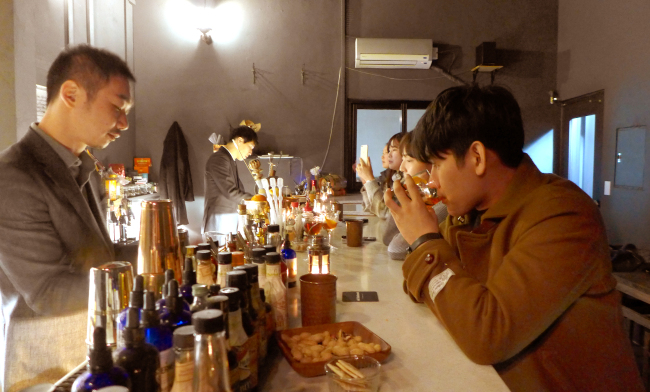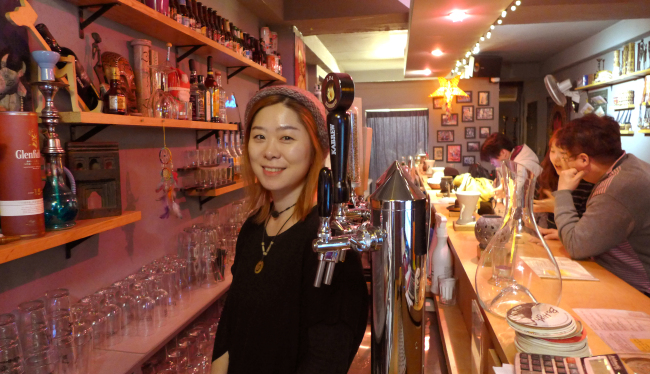[Weekender] ‘Honsul,’ the art of savoring the tipsy self
By Korea HeraldPublished : Jan. 6, 2017 - 17:21
With a pensive gaze, Park Si-in sips an old fashioned, a whiskey-based cocktail, at a dim, jazzy bistro nestled in a gentrified alley in Seoul.
“I don’t think about anything,” she says. “I come here to empty and organize my thoughts. I need it, regularly and personally. Drinking alone is actually enjoyable.”
Beside her, Kang Dong-wan, a university student majoring in graphic design, chatters with a bartender.
“The bar acts as a sort of a mental hospital, a healing space,” explains Kang, in an interview with The Korea Herald. “Everyone these days has a tough time in their lives. People need space where they can let out their secrets and feelings. It’s hard to do that with friends, so that’s why I come here, to chat with the bartender.”
“I don’t think about anything,” she says. “I come here to empty and organize my thoughts. I need it, regularly and personally. Drinking alone is actually enjoyable.”
Beside her, Kang Dong-wan, a university student majoring in graphic design, chatters with a bartender.
“The bar acts as a sort of a mental hospital, a healing space,” explains Kang, in an interview with The Korea Herald. “Everyone these days has a tough time in their lives. People need space where they can let out their secrets and feelings. It’s hard to do that with friends, so that’s why I come here, to chat with the bartender.”

Amid the rise of single-person households in Korea -- now comprising a quarter of all families here -- a growing number of people have taken up the habit of drinking alone, a phenomenon known locally as “honsul.” An increasing number of bars cater to this segment of customers, and the practice has been dramatized in soap operas.
“The biggest benefit of living alone is finding the time and space to reclaim solitude,” wrote Eric Klinenberg, professor of sociology at New York University, in his international best-seller “Going Solo: The Extraordinary Rise and Surprising Appeal of Living Alone.”
Professor Andrew Kim, sociologist and dean of Korea University’s Graduate School of International Studies, told The Korea Herald that the trend is a counterreaction to people’s “excessive obsession” with groupthink mentality.
“Koreans cannot say ‘no’ to group activities,” Kim said. “There is an implicit sacrosanctity in doing everything ‘together,’ the basis of which forms Confucianism. This can put a lot of stress on people, who have very little time for themselves.”
Due to the prevalent need to “save face,” Koreans are forcibly dragged into eating and drinking with others, he said, adding that people are only beginning to appreciate the virtues of privacy.

Song Eun-jin, who runs the bar Saraswati in Yeonnam-dong, northern Seoul, says many of her customers come alone, reflecting the neighborhood’s demographics.
“About 60 percent of the lone clients are men, usually in their early to mid-30s. Some gossip with me and tattle their worries and concerns,” she adds.
As the town has become more posh and expensive in recent years, buoyed by the upscale gentrification of the nearby Hongdae district, living space became tighter, pushing the singletons outside their homes.
“Most of them come here to enjoy being left alone,” Song observes. “They read books, listen to music, do their work or simply gawk in silence. Being constantly hassled at work, I can see there are conscious efforts nowadays to luxuriate in loneliness.”
The owner also argues that the taboo against doing things alone in Korea is dissolving.
“Drinking alone doesn’t mean one is desolate desperately,” Song says. “Rather, people drink alone for the sake of reclusiveness. Once you get the hang of it, it is surprisingly irresistible.”
By Joel Lee (joel@heraldcorp.com)
-
Articles by Korea Herald


![[Exclusive] Korean military set to ban iPhones over 'security' concerns](http://res.heraldm.com/phpwas/restmb_idxmake.php?idx=644&simg=/content/image/2024/04/23/20240423050599_0.jpg&u=20240423183955)

![[Graphic News] 77% of young Koreans still financially dependent](http://res.heraldm.com/phpwas/restmb_idxmake.php?idx=644&simg=/content/image/2024/04/22/20240422050762_0.gif&u=)



![[Pressure points] Leggings in public: Fashion statement or social faux pas?](http://res.heraldm.com/phpwas/restmb_idxmake.php?idx=644&simg=/content/image/2024/04/23/20240423050669_0.jpg&u=)










